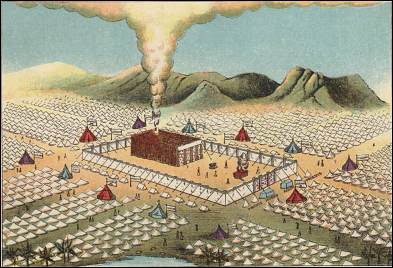Money as a Spiritual Barometer
Jesus taught a lot about money, for He knew that the making and spending of it occupies much of our time and thought. The Savior did not tell us in what ways to make more and spend less money. Instead, He encouraged us to be compassionate and faithful stewards of the financial and material resources He has entrusted to our care.
In the parable about the rich man and Lazarus (Luke 16:19–31), Jesus put His finger (so to speak) on a basic truth about money. It’s not really ours. Indeed, the Creator has placed it in our hands to use in a prudent and godly manner. This means that the way in which we use the money at our disposal is a genuine barometer of the spiritual condition of our heart.
Luke 15 and 16 contain several parables Jesus taught as He made His way to Jerusalem (9:51; 13:22; 17:11). The parables of the lost sheep (15:1–7) and the lost coin (vv. 8–10) convey a similar theological truth. God, in His grace and mercy, diligently and thoroughly seeks to save people who are spiritually lost.
The parable of the lost (or prodigal) son (vv. 11–32) highlights the joy a father experiences when his younger son—who left home to squander his inheritance on degenerate living—returns home. But the story also involves the arrogance of the older son, who disapproves of the celebration welcoming his brother home.
Next, Jesus instructed His disciples to prepare themselves for their future spiritual security by telling them a parable about a shrewd household manager (16:1–15). We learn that even though the steward was unethical in his business dealings, he had foresight.
Verses 16–17 are about the relationship between the Mosaic Law and the good news. Verse 18, which concerns divorce and remarriage, might have been placed here as an example of how the religious leaders tended to overlook the spirit of the Law.
The Pharisees were notorious for their greed and for using wealth to gratify their selfish desires (v. 14). Jesus wanted His followers to live differently. The issue was not whether to have wealth, but rather how to use it in an appropriate way.
Specifically, the Redeemer urges His disciples to use their God-given material means to advance the cause of righteousness in the world. For instance, by using wealth in a judicious and discerning manner, believers could ease the affliction of those in need.
Jesus also stressed that if His disciples became enslaved to material things, they wouldn’t be able to serve God (v. 13). Ultimately, an unchecked desire for temporal riches pushes believers away from the Lord.
Not surprisingly, the religious leaders listening in on Jesus’ teaching sneered (or, more literally, turned up their noses) at Him (v. 14). Their view of wealth was that material blessings are divine rewards for performing good deeds.
The elitists would do so-called spiritual works, anticipating physical benefits from God in return. For them, wealth was a sign of their presumed goodness.
Jesus let the Pharisees know that God was aware of their rapacious greed (v. 15). The Savior noted that what the religious elitists greatly prized (namely, the selfish accumulation of wealth) was utterly abhorrent to God.
After Jesus’ antagonists scoffed at Him, He offered a graphic example of what happens in eternity to people who, during their earthly sojourn, are narcissistic in their use of their worldly possessions. This sinful tendency is represented by the “rich man” (v. 19), who is traditionally known as “Dives” (from the Latin term for “rich”).
Dives was so extravagant in his wealth that he dressed in outer garments colored with an expensive, purple dye (extracted from murex, a tropical sea snail). Furthermore, he wore costly undergarments made out of delicate linen. He not only feasted sumptuously, but also flaunted his wealth to others.
Jesus’ parable directs our attention to a city “gate” (v. 20), where there was a “beggar” named Lazarus (not to be mistaken for the individual in John 11:43–44, whom Jesus restored to life). During the first century A.D, begging was the only means of support for those with a severe physical affliction, such as being “covered with sores” (Luke 16:20).
In this case, Lazarus was not only poor, hungry, and sick, but also possibly crippled. Within Jewish society at that time, the people most respected were the religious leaders, such as the Pharisees and the priests, along with the ruling classes.
Affluent lay persons and the working middle class were somewhat respected. Yet, they were a little lower in the social order and tended to look up to the Pharisees and other religious leaders.
At the bottom of the social hierarchy would have been beggars such as Lazarus. During the first century A.D., it was erroneously believed that sin caused all suffering, especially such a serious ailment as skin ulcers.
Moreover, in that day, numerous cities had an open space or plaza just inside the main gate. As the center of public life, the town plaza was used for a wide variety of purposes.
We can imagine Lazarus spending most of his time at the gate of the city where the rich man lived. It is not hard to envision Lazarus sitting on a straw mat and holding up a saucer into which sympathetic passersby could drop a few spare coins.
The name Lazaruswas the Greek form of the Hebrew name, Eleazar, which means “God has helped.” Yet, during his earthly sojourn, Lazarus suffered greatly from his physical disabilities and yearned for any assistance he could find.
For instance, Lazarus desired to be fed from the scraps of food that fell off the table where the rich man would dine (perhaps with others in public). Wild street dogs fared better in being able to scavenge for food to fill their empty stomachs.
Indeed, the situation was so deplorable for Lazarus that packs of wild dogs roaming the streets would routinely lick his open sores (v. 21). This increased his risk of infection, since dogs were prone to consume garbage and the carcasses of dead animals.
In life, the beggar and the rich man were separated by material abundance. And in death, they were separated by spiritual wealth.
So, for example, when Lazarus finally died, God’s angels brought him to “Abraham’s side” (v. 22). Scripture reveals that Abraham was the father of Isaac and grandfather of Jacob, the patriarch of the nation of Israel, and one of the all-time greatest persons of faith.
Jesus’ reference was a symbolic expression of the blessings of paradise. Indeed, Jewish literature of the period regarded “Abraham’s side” as the place of highest honor.
Behind the metaphor was the ancient Near Eastern custom of guests at a banquet positioned on their sides while lounging at a low-lying table. The attendees were reclined in such a way that one person’s head would be physically close to the torso of the next person seated nearby. In Jesus’ parable, Lazarus is portrayed as feasting sumptuously in eternal joy at the side of Israel’s famed ancestor, Abraham.
Verse 22 states that the rich man also eventually “died and was buried.” In contrast to Lazarus, Dives found himself in “hell” (v. 23). The underlying Greek term is hades. It refers to the abode of the wicked dead and is comparable to the Hebrew term sheol(Job 7:9; Pss 6:5; 89:48; 116:3; Isa 38:10, 18).
Jesus’ parable discloses that hadesis a place of “torment” (Luke 16:23) in which the unrighteous endured the unrelenting misery produced by flames. It would be incorrect to conclude from this verse that the wealthy automatically go to hell and the poor end up in heaven.
Economic status does not determine one’s eternal destiny. In this case, Lazarus trusted God, while Dives put his faith in his wealth. The focus of their lives, not the amount of their material possessions, determined their respective eternal futures.
For the former rich man, the agony was so great that he pleaded with “Father Abraham” (v. 24) to show him mercy. Here we find the story depicting the place of bliss and the locale of anguish as being sufficiently close to permit some visual and verbal communication between individuals. It’s unclear, though, how literally or figuratively to interpret such details.
In the case of Dives, he pleaded with Abraham to send Lazarus to dip his finger in some water. Then he would be able to cool off the tongue of the former rich man, who was now in terrible pain due to heat produced by hell’s “fire.”
Amazingly, Abraham spoke somewhat sympathetically to the former rich man, and even referred to him as “son” (or “child,” v. 25). The patriarch reminded Dives that during his lifetime on earth, he enjoyed great material wealth. Meanwhile, Lazarus endured unrelenting, abject poverty, which the former rich man did nothing to relieve.
Now, in the afterlife, Lazarus was being consoled, whereas Dives was in anguish. Implicit in Abraham’s remarks is the truth that these drastically different outcomes were appropriate and just.
The patriarch explained that between Dives and Lazarus was a huge, impassable “chasm” (v. 26). As a result, those consigned to hell could not cross the immense gulf to heaven. Likewise, the inhabitants of heaven could not leave their eternal dwelling place in God’s presence to visit those in hell.
These verses indicate that heaven and hell are not imaginary places. Instead, they are real locales where, in death, the righteous and unrighteous (respectively) exist for all eternity.
The former rich man must have felt desperate when he learned that he was unable to receive help from Lazarus. So, Dives pleaded with Abraham to send Lazarus to other family members who were still alive on earth (v. 27).
Dives was especially concerned for the eternal welfare of his five brothers. Evidently, they were just as self-absorbed and calloused toward the needs of the impoverished as the former rich man had been. Dives conjectured that if Lazarus could give the rich man’s brothers a word of warning in advance, there was the slim possibility they might abandon their wickedness, adopt a godlier lifestyle, and avoid being condemned to “this place of torment” (v. 28).
Abraham retorted that the household of Dives was already blessed with the writings of “Moses and the Prophets” (v. 29). This phrase was a customary way in Jesus’ day of referring to the entire Old Testament Scriptures.
The former rich man knew his five brothers well enough to realize that the Hebrew sacred writings would not convince them to abandon their evil ways and escape judgment after death. Dives reasoned that if someone such as Lazarus would come back from the grave and admonish them to change, then they surely would “repent” (v. 30). The latter translates a Greek verb that means “to change one’s mind” or “to amend one’s ways.”
Abraham declared that if the five brothers refused to pay attention to the Old Testament Scriptures, they would not even listen to someone who came back from the grave to warn them (v. 31). This conclusion to Jesus’ parable might have hinted at His own resurrection.
Specifically, the religious leaders would spurn the testimony of the risen Lord, just as they dismissed the messianic prophecies about Him recorded in the Hebrew sacred writings. In short, to renounce the Son—the Father’s only provision of salvation—was to leave oneself eternally condemned (see Heb. 6:4–8; 1 Pet. 2:7–8).
It’s possible to draw from Jesus’ parable several principles about the afterlife: (1) How we live in this life affects our status in the afterlife. (2) One’s eternal destiny is fixed at death. (3) The righteous go to heaven, which is a place of blessing and comfort. (4). The unrighteous go to hell, which is a place of torment. (5). There is a conscious awareness in the afterlife.
Many people today are tempted by rapacious desires to spend their money on things that don’t ultimately matter. God does not necessarily summon believers to be misers or deny themselves what they need.
Yet, as the parable of the rich man and Lazarus teaches, Christians cannot serve two masters (Luke 16:13, 19–31). Their hearts either follow their material or spiritual pocketbooks. God is most pleased when Jesus’ disciples invest their resources in what is of eternal significance.



